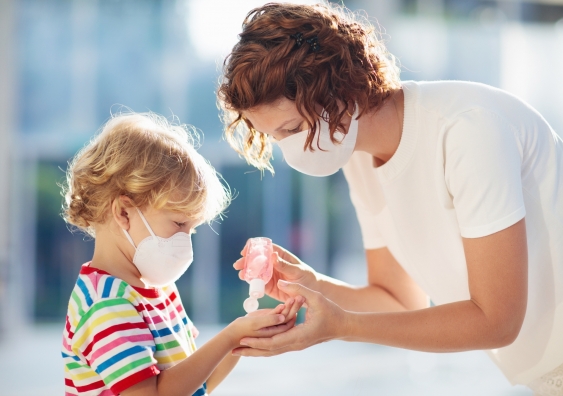The needs of children must be considered during coronavirus pandemic
We need to adopt a child-centred approach in this pandemic in order to reduce trauma levels.
We need to adopt a child-centred approach in this pandemic in order to reduce trauma levels.

Heidi Harrington-Johnson
Media & Content
0413 834 368
h.harrington-johnson@unsw.edu.au
One community that has been insufficiently addressed during the COVID-19 pandemic is ‘children’.
Their unique needs and rights have not been sufficiently taken into account.
Children are now perceived as ‘non-vulnerable’, since the group that is in danger are the elderly.
While it is true that death rates among young people from COVID-19 are low, in comparison to the elderly, children’s lives, survival and development are at risk too, albeit differently.
In Australia, the Prime Minister holds almost daily press conferences, but they are held in the evenings and are primarily addressed at adults.
In New York, the decision to close down all schools was announced on 9.30pm on a Sunday night, after most school aged children already went to sleep, assuming that they would go to school the following day, only to wake up on Monday morning and realise that the world, as they knew it, had ended.
Norway, however, shows us that a different model is possible.
Prime Minister Erna Solberg, together with the Minister for Children and Family Kjell Ingolf Ropstad and Minister of Knowledge Guri Melby held a press conference just for kids, where they answered their questions.
This gave children the opportunity to hear, first hand, why their world had been turned upside down.
Significantly, it sends the message to children and adults that children’s citizenship ought to be respected.
We are facing a prolonged crisis that has dramatic impact on children’s lives, and there is a need to adopt a child-centred approach in order to reduce trauma levels, which can hinder their medium and long term development.
Here are some suggestions of things that can be done to meet children’s needs in ways that respects the multidimensions of their lives and their agency:
Children, just like adults, face increased instability and anxiety.
Communicating to them and with them, and not just with their parents — and providing them with information that relates to policies that affect their lives can enhance their mental well-being.
Governments should explain in child friendly ways the reasons behind the drastic measures that are taken, especially measures that affect children directly and profoundly, like schools closing.
Children’s sense of time is different from those of adults.
Travel restrictions that can last months, or school closures that can last ‘only few weeks’, might look like an eternity for children.
It is imperative that they will be told that their routine will be very different in the coming months, but also, and this is probably more important, that their needs and rights be accounted for when putting these measures in place.
In other words, periods of time of disruption that adults can comprehend and deal with are different to children, and this should be factored in when making policy decisions.
One of the reasons that the Federal Government is reluctant to order schools to close is the risk of students losing the entire academic year.
While this is a child-centred consideration, it does not sufficiently account to the main function of schools, which is education.
Schools are not a state-funded baby-sitting service, and being physically at school does not guarantee any effective learning processes, even if politicians suggest the opposite.
If students come to school stressed and fearful, waking up at a house where parents lost their job, and their teachers are anxious, the chances for any meaningful education are slim.
Similarly, parents who home school while being exhausted and stressed, and pressed to work from home, is far from ideal or reasonable.
Using patch work, rushed, distance learning classes, might not be effective too, and can lead to even more frustration for children and parents alike, and curtails students' education.
While governments are trying to provide some alternative educational opportunities, it is useful to take stock at the mental well-being of students and teachers and to adjust the educational means, and expectations, in order to reduce frustration and increase the chances for positive learning experiences, and outcomes.
Research shows that in times of instability, especially economic uncertainty, domestic violence rates increase dramatically.
When entire families stay at home for long hours, potentially for months, the risk for women and children is higher than ever, and we already see an influx of mothers and children coming to shelters in the last week.
It is imperative that support services, including emergency shelters, continue to become available, together with awareness raising campaigns and other educational measures.
The most vulnerable children are babies and toddlers, and children with disabilities.
These groups of children require special attention in calmer times, and especially now. Many parents struggle with raising children with special needs, and the rates of children with disabilities abused by their parents is higher, compared to children without these disabilities.
With the unavailability of support services, and increased stress, there is a risk for a pandemic of domestic abuse of these children, and of babies.
Policies addressing this concern, and to mitigate it, must be put in place.
As we have seen in Italy, Spain, the United Kingdom and New Zealand, more drastic changes are looming, particularly a nation-wide lock down. These measures and the chaos they create will have an immense effect on children’s lives, present and future, which should be accounted for.
A child sensitive policy recognises that children are not just objects in the decision-making process, or by products of adults and family centred policies, but are subjects too.
As such, we need to recognise accountability is not mainly an adults’ domain; children deserve accountability as well.
Dr Noam Peleg is a senior lecturer in UNSW Law.